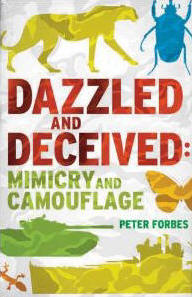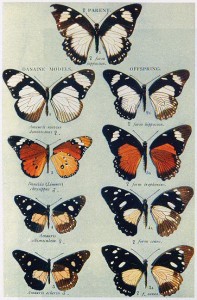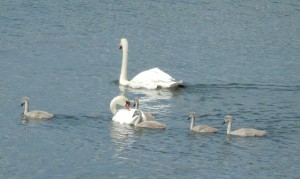
Aah. Ducks with ducklings. Coots with Cootlings. Geese with Goslings. Swans with Cygnets. Moorhens with … chicks. Whatever the charmingly mediaeval diminutive nouns, it was a day for walking around the London Wetland Centre, enjoying the ‘sunny spells’ and the bright display of wild flowers, artfully seeded, and delighting in Mother Nature’s ability to conjure up fluffy sentimental feelings about roughly duck-shaped balls of fluffy down feathers.
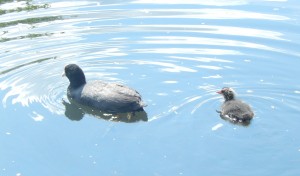
I’d gone alone to see if there were any interesting dragonflies, but there weren’t many about: a warmer day is always better. But there was a Black-Tailed Skimmer basking on one of the ‘wildside’ paths.
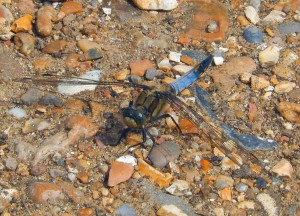
Apart from that, I glimpsed one Hawker dragonfly – probably a Hairy dragonfly, as the only kind other than the Emperor seen there in the past month; and there were plenty of Common Blue and Bluetail damselflies about.
As for butterflies, it was alarmingly empty: a couple of meadow browns, a small white or two, and a female brimstone the highlight. My alarm at the lack of insects in general in England is growing. If it’s neonicotinoids – hot on the heels of all the earlier insecticides, many now rightly banned for their destructive side-effects on wildlife – then we are watching a manmade calamity. The BBC noted that some ditch water was toxic enough to be used, just as it was, as an insecticide spray for crops. The effect of that on dragonflies can only be imagined: a sad thing, as (living in rivers and ponds rather than on farmland) they have to some degree escaped the disaster that has all but eliminated our farmland birds, bees and butterflies.
But on a dead tree, wildside, was another fluffy-duckling sight, this time from a distinctly arboreal bird.
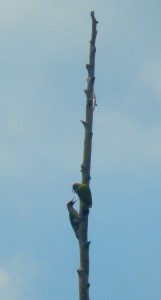
Two Green Woodpeckers, presumably a parent and a newly-fledged juvenile, were clinging to a dead tree, the parent a little higher up, the youngster apparently begging for food with open beak. The family drama went on for several minutes.
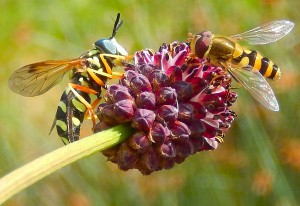
Tiny wildlife shows were visible on the flowers: here, two hoverflies of different species, busy being Batesian mimics of dangerously stinging wasps (but harmless as doves) are feeding, slow and relaxed in the sunshine, on the small flowers in a Great Burnet’s flowerhead. They didn’t seem at all bothered by each other, or by any risk from predators. But despite their glorious colours, it was duckling day today.

